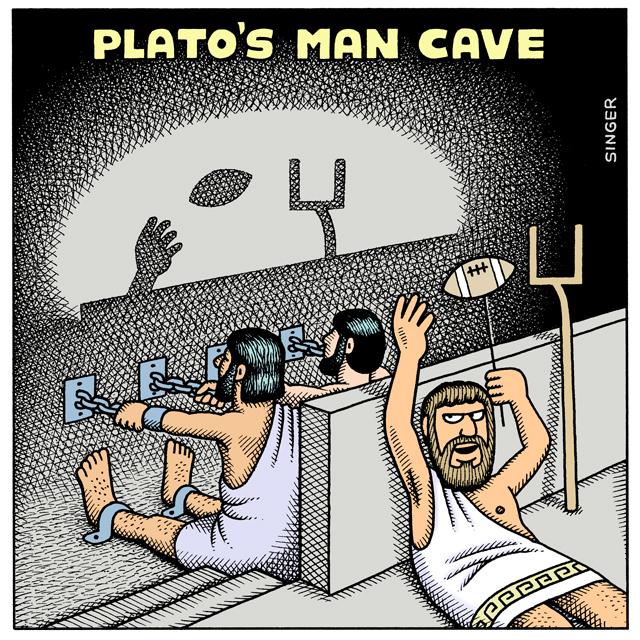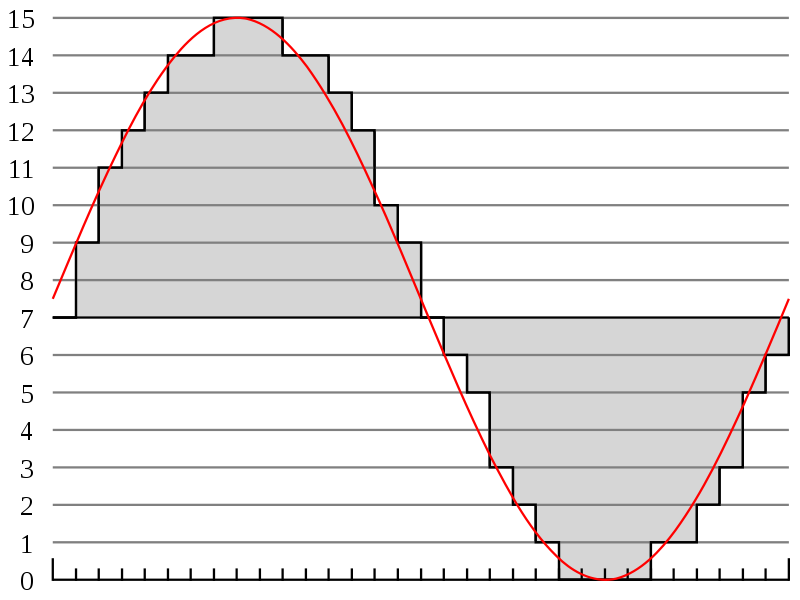We live in a world of lies. But what is the nature of those lies? Plato says they’re like a cave, sheltered from the light of truth, in which the average man watches shadows on the wall and imagines the show to be all of reality. The shadows are the world of symbols in which we languish without philosophy, the internally- and externally-constructed stories mediating between us and reality. To escape this theater we must transcend the mere reports of the senses to perceive deeper natures of things. We must (usually with the help of an already-enlightened teacher) turn around to see the actual objects casting the shadows. Ultimately, these objects will themselves draw us toward truths beyond any physical beings, and we leave the cave to bask in the initially-painful but ultimately-gratifying light of the sun, what Plato calls The Good.


But Plato had a certain advantage. He lived a long time ago, before the hollowing out of metaphysics and the philosophical alienation of man from the world. A primary aspect of that alienation is the modern tendency to nominalism. The metaphor of the cave cannot describe nominalism, because nominalism is the belief that there are no objects to be directly apprehended under the light of the sun, that to think of things is only ever to perform a self-contained operation in one’s mind, and never to actually grasp a truth outside oneself, because there are no truths outside oneself to grasp. Anything you think you know beyond the shadow theater on the cave wall is, generally speaking, all in your head. Nominalism is when you cannot say the waterfall is beautiful, but only that the way you perceive it is beautiful, and others may perceive it beautiful. Nominalism is when we say that our categorization of things is totally mind-dependent and exceptions to the rule are arbitrary, that “dogs have four legs” is an act of will, since some have three and some have five. Nominalism is when everyone can agree on the facts of the murder but whether it is evil is a matter of opinion. It’s popular nowadays.
A better metaphor for nominalism sits before your very eyes: the computer screen.
A screen is a mirage as surely as shadows on a wall, but they differ in a vital respect. Shadows on a wall, projections, are cast by real objects, and so lead back to real objects. Even in a modern movie theater (until they’re all digitized), the projection can lead us back to the film, a physical object containing the image of that which is projected, which in turn will lead us back to those who made the film and the images they used to create it, etc.
Film, like shadow puppets, is an analog medium; that is, its message is embodied in its very physical form. Another analog medium is a vinyl record, whose actual grooves record sound in miniature. From vinyl and film, we abstract sight and sound in the reverse process by which they were recorded; all we are doing is following a miniature map back around the original territory.* The artificial image and sound captured in plastic always corresponds to something; something was placed before the camera or the microphone and cast this light or moved that needle. It is essentialist, the opposite of nominalist; our sense of the waterfall’s beauty ultimately must be caused by something in the waterfall; it is possible to locate the real object casting the shadow on the cave wall and realize the shadow to be merely a shadow.

The computer screen, however, and digital sound (such as we hear on Spotify or, quaintly, CDs) are a much better metaphor for our beleaguered relationship with reality today, because they are purely constructions. The letters you see on the screen before you do not exist in themselves. They are the arrangement of thousands of atomized and independent pixels, organized by an external intelligence (yours truly, working with the makers of your phone and its software) into an image to fool your eyes. The more pixels there are, the easier your eyes are to fool, but, ironically, the more shattered and atomized the underlying reality of whatever you are seeing. The period at the end of the previous sentence is not one thing, but the cooperation of hundreds of things that, upon scrolling this page, will instantaneously be doing something else, giving the illusion of motion where none exists.
Digital mediums, an engineer would explain to you, can never, in theory, be as good as analog ones. When an old-fashioned film camera or a tape recorder capture sight and sound, they capture the entire scene before them, without gaps; a mountaintop vista hits the film just as it hits your eye; a violin vibrates a membrane in the mic just as it does in your eardrum; these are what sounds and light are. When my DSLR and my USB microphone capture the same scenes, however, they do something profoundly different. They break down what they receive into a staggering amount of small pieces, a veritable sea of binary. “I will tell you ‘on’ or ‘off’ forty-four thousand one hundred times, and that will be the sound of this cello for one second.” This is the only language a computer processor understands. But in real life, the sounds of the cello or the image of the alps doesn’t come in thousands of discrete pieces; reality is curved, shaded, continuous. The digital image or sound always has information missing by definition. It is imperfect. And we don’t care.

We have grown to love and appreciate the possibilities of digital, where no image need ever correspond to an external reality. Just as there is something endlessly fair in saying “the waterfall strikes my mind as beautiful, but may strike other minds differently,” there is something freeing in declaring the images before our eyes to be constructed of pixels and the sounds in our ears to be discrete slices of volume and pitch, a certain distance we gain from the strictures of the things we experience. Unlike a projection, there is no real object that was placed before a camera or a mic to construct this experience; on the contrary, the only real thing is the screen of pixels on which they were projected, a hylic, protean object which can take the form of anything we imagine — and so why assume there is anything more than imagination?
Some may object that human senses are, no matter what digital media we consume, inherently analog — our eyes and ears cannot see or hear in discrete ones and zeroes; these digital representations only work because they can, in their high resolution, imitate analog realities. So shouldn’t we always recognize the digital for mere approximations? This, however, is not the direction many have taken. Indeed, against nominalist philosophy one may (and many have) raised the objection that the human mind simply cannot understand the world in any way other than with essences, and that to deny our direct apprehension of the nature of things is tantamount to a denial of the human mind per se. These objections, historically, have been met with a skepticism that seems deeply entrenched in the nominalist view: Who says these impressions are not, in themselves, constructed? If enough pixels can imitate a view of the Alps, who says enough pixels cannot imitate an impression that there are no pixels?
And thus, we reach the death of Plato’s cave.
For in the cave, when we are led kicking and screaming into the light to discover what is more eternal and real than what our senses tell us, we are able to look back at the shadows and see them as pale imitations of the truth. But from the screen, when we are led away into the light (perhaps after a night of binge-watching Netflix), the greater reality of actual objects is not as readily apparent. It’s not that I confuse, say, Stranger Things for real life. It’s that, if I begin to think of my field of view as an field of independent pixels working in tandem, there is nothing inherently more real about one image than the other. Stranger Things is not a shadow cast by some intricately-constructed Hollywood reality; it is another mere arrangement of things, a different configuration placed before my senses, the causal hierarchy lost, for there is no such thing as truly to see when seeing is defined as millions of sensory switches being either on or off.
We children of the screen live in an entire reality made of symbols, and there is nothing for them to symbolize but more symbols, and if this forms an infinite regress, perhaps that is a symbol as well. Indeed, one suspects at times, in the dark of night, that it is this very belief which empowers the modern intellectual with their depressed and placid yet utterly immovable detachment.
All is not lost, however. For we children of the screen possess a path to the sun (and beyond) that Plato himself couldn’t dream of, a path open only to the deepest cave dwellers, blind to all but the glow of their digital dream theater. Plato, after all, could only reach the Highest Truth by Plato being right. We can reach the Highest Truth even when Plato is wrong.
Since the world of Truth is closed to us, since we deny, by training, the underlying essences of things, we are cut off from our Creator as the Ultimate Unity, the life and soul of each thing, the light casting every shadow. But we children of the screen can know, better than any generation before us, our Creator as the Creator, the One who brings forth the universe from nothing. We have been taught to deny that there are any objects casting the shadows, that
We are the first generation to find in our screens real images that are cast by no object, somethings that come forth from nothing, the paradoxical denial of the earliest philosophical axiom that testifies to the Nothing beyond all forms, what Maimonides calls the “Existence without an Existing Existence,” the nothing behind our somethings creating the illusory appearance of a non-discrete, continuous reality. He places before our eyes a world full of natures separate from Him, a world that those leaving the cave think is continuous, analog, curved. But the children of the screen suspect that in truth the world is discrete, digital, created independently, ex nihilo, in every detail, that nature itself does not have the final say, that every nature is rooted in an inexplicable individual act, a subjective choice not unlike our own perception of a waterfall.
What we have lost from the ancients, we have gained from the moderns. G-d is in the pixels.
*Even if our music and movies are heavily edited, it is the editing, in analog, that we directly grasp; contrast to the digital image, in which every edit must pass through a distancing layer of falsehood before it reaches out eyes.
analog chassidus computers digital extended metaphor philosophy Plato
Wow Tzvi, once again you are able to intertwine the past and the present with Chassidus. Incredible!